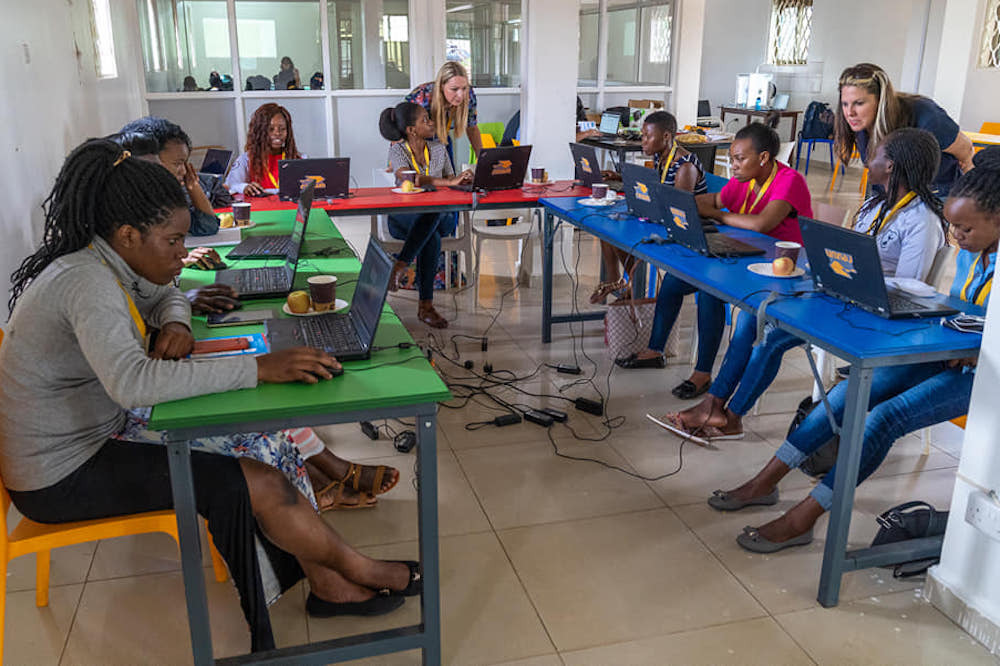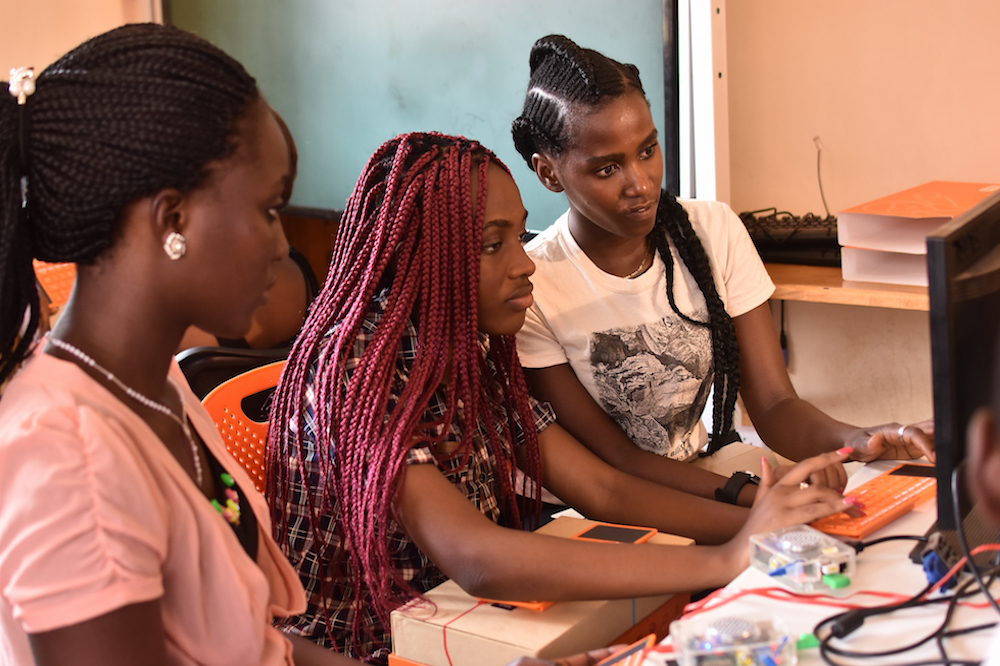
World Youth Skills Day: using digital learning to close the skills gap

Global Youth Ambassadors, Technology and education
With a crisis looming for young people, a Theirworld Global Youth Ambassador from Nigeria gives her take on the digital divide and how to tackle it.
Youth skills have never been more vital. By 2030, more than half of all young people will not have the basic skills needed to get decent jobs.
The pandemic is only making a bad situation worse. Before the Covid-19 crisis, the number of young people (aged 15-24) around the world not in employment, education or training was rising. And youth employment plummeted by 8.7% last year – compared with 3.7% for adults.
Theirworld is working hard to ensure young people – particularly girls – are not left behind. Part of our mission is to equip them with the skills they need to find good jobs or become entrepreneurs.
Our Skills for Their Future programme builds on the previous success of our Code Clubs for girls in several sub-Saharan African countries and delivers a digital literacy curriculum to students aged 16 to 20. Our latest project launch, for 1,000 girls and young women, is in partnership with Women in Technology Uganda (WITU).
But Theirworld also focuses on giving youth the tools they need to campaign and make their own voices heard by global leaders. We do that through our Global Youth Ambassadors programme, a network of nearly 1,000 young people from more than 70 countries working together to end the global education crisis.
One of them is Motunrayo Fatoke from Nigeria, who is also a member of Theirworld’s Project Amplify. They are a cohort of 12 passionate GYAs who are ready to take their education campaigning to the next level. To mark World Youth Skills Day today, Motunrayo gives her take on the digital divide and how to tackle it.
Ending the digital divide - by Motunrayo Fatoke

Digital learning, a concept that was formerly felt futuristic, has now become the saviour in a fast-evolving post-pandemic world. Who could have thought?
While it has been easier for us to adopt digital technologies into our economy, it’s been harder for the education sector, especially in the global south. We are running the risk of creating a generation who have missed out on valuable skills and education.
This World Youth Skills Day, I am thinking about those children who are being left behind – simply because they live in remote areas, do not have access to fast internet or cannot afford the devices.
This disruption to their education inspired me write about the skills gap that’s widening among children, as digital literacy becomes more and more of a necessity for young people to enter the workforce.
In only a few months, the pandemic disrupted the daily lives of people around the world. For millions of schoolchildren, education switched to digital platforms and online communication, which further expanded the already big gap between the privilege in urban communities and the less privileged in remote communities.
In Nigeria, before Covid-19, four in 10 Nigerians were living in extreme poverty- many of whom were already behind on the learning scale. Projections from the World Bank Group suggest that the combined effects of the Covid-19 crisis and natural population growth in Nigeria could leave 100 million people living below the national poverty line by 2022.
Digital literacy is a fundamental skill for students in the 21st century – but the most marginalised children are missing out. The existing learning gap continues to grow and if we do not provide them with these skills, these children won’t be able to keep up with their peers around the world or continue to learn.
With this in mind, it has been disappointing to see governments not prioritising education and skills development for children and young people in their pandemic recovery plans.

More girls are learning about technology and developing their skills, confidence and creativity (Theirworld / Moses Mbogo)
So we, the young people, schools and community members, have looked for our own solutions. One of the biggest challenges to overcome has been the need for students and teachers to use digital tools in order to transition to learning from home.
To solve this, my colleague and I have been working on a first-of-its-kind innovation in Nigeria. Digilearns leverages adaptive learning strategies and low-cost technology to make learning readily available, easily accessible and extremely affordable for learners from low-income families, remote areas and nomadic settlements without the use of internet connectivity.
Students across Nigeria can access instantly-delivered, locally-relevant and curriculum-aligned educational materials via SMS or our specialised USSD code on any mobile network with a basic feature phone.
Only a small number of school-aged children, mostly from high- and middle-income households could afford to continue learning digitally. This is why innovations like Digilearns, that bridge learning gaps, are essential. Access to smartphones among low-income households is low and that has meant online learning has been out of reach for so many children.
This project has had many outcomes. On top of increasing access to home learning such that children can learn whenever and wherever, students have been able to develop basic tech skills and improve their digital literacy. The platform provides tailored learning content for students and has other interesting features such as quizzes, ask a teacher, past questions and an offline Google search feature.
Most of our beneficiaries used Digilearns in preparing for their external exams and the results showed what is potentially possible and achievable if the government begins to invest in the future, which is swiftly going digital.
Looking forward, I hope to see the government give more priority to education. The budget of education should be increased to accommodate and foster effective implementation of digital tools and innovations like Digilearns, making it possible for education to be accessible to all as well and the digital skills gap to be closed for good.
More news

